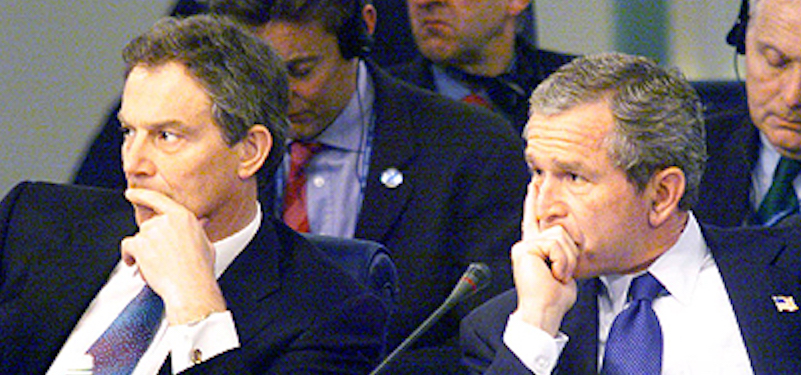Blair failed Iraq, but his cabinet and our parliament failed us

My interest is in the planning and execution of 2003-2010 post-invasion ‘reconstruction’ strategies in Iraq, the bit of today’s Iraq Inquiry Report that I am best equipped to assess. So I’m reading volumes six and ten with care.
Politically though, Sir John Chilcot’s scathing summary confirms to me what I already suspected, before the vote to go to war, before I joined the Stop The War March in February 2003 and before I joined the reconstruction process to defend the rights of Iraq’s independent media after the invasion.
Tony Blair overestimated his influence over the Bush Administration, perhaps based on his success in that area with Clinton during Kosovo. He clearly committed to war in Iraq as part of his failed courtship of George Bush, and was swiftly locked into a timeline for a Spring 2003 attack that required the tailoring of UK diplomatic strategy to meet that deadline.
Meeting that deadline became the priority – not the UK’s strategic objectives in Iraq, and even less, securing the diplomatic solution that was always open to the UK & US, and which Blair actively undermined in favour of a regime-change strategy. Blair operated outside Britain’s traditions of cabinet-led collective responsibility, and when given the chance his Cabinet did not question his claims when they should have – especially when it became clear to officials that Blair was conducting business outside government, face-to-face, direct with Bush.
The Cabinet Office, MoD, FCO and particularly Clare Short at DfID, failed to properly challenge, represent or oversee post-conflict strategy and Blair did not ensure that this happened. Most glaringly ministers confirmed, without properly questioning, Blair’s conclusion that Iraq had exhausted the opportunities for alternatives to invasion offered by UN resolution 1441. None of them asked Goldsmith why his view that the safest legal course was to seek a second UN resolution had changed.
Similarly Short and the others failed to challenge Blair’s post conflict strategy, disconnected as it was from the reality of the UK’s emerging obligations in Iraq and its inability to meet them. They did not press Blair, just as Blair did not press Bush on the clear absence of a US post-conflict strategy and whether its absence threatened UK strategic objectives. Then Parliament, in defiance of the clearly expressed will of a sizable number of UK citizens, shamefully gave its authority to the whole process.
David Cameron told Parliament today that he can’t find an accusation of deliberate deception in Chilcot’s report. But the UK government and the Commons failed to ensure that the options for deterrence and containment of Saddam’s aggressions had been exhausted and that there was a legal case and a practical capacity for the UK to take pre-emptive action against a direct threat to the UK – or even if such a threat really existed.
It was bad politics, but was it “deceit”, “wilful misconduct,” or “war crime”? A court, not Chilcot (as he made clear) would have to decide that last allegation. But given the clear authorisation of both government and the Commons, Blair cannot be held solely, even primarily, responsible for the crime of the Iraq War.
The claims today of those who were complicit, that they were acting on the information available to them at the time and that were they acting to uphold the authority of the UN at the time are no defence. They – and as MP Crispin Blunt pointed out today in the Commons, the media too – failed to interrogate and question these conclusions, as was its duty. It was a collective responsibility and thus a collective betrayal.
No amends can be sufficient for the people of Iraq. To me, it was a shameful betrayal of government and parliamentary responsibility to the people of the UK. Some MPs may yet try use an ancient law to try to impeach Blair – last used in 1806 when the Tory minister Lord Melville was charged for misappropriating official funds.
But no court is necessary to ensure that Blair – and more than a few cabinet ministers – never hold public office of any kind, ever again. Only the judgement of history.

